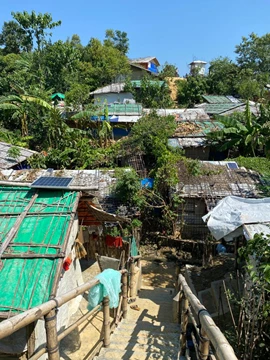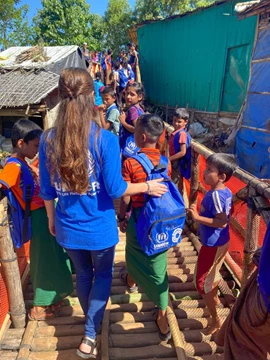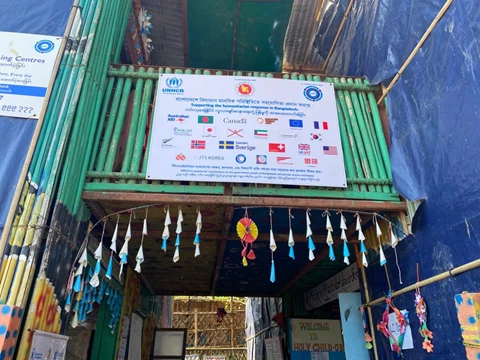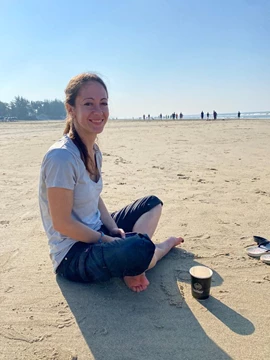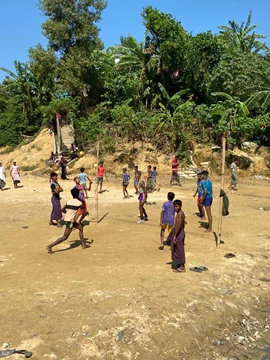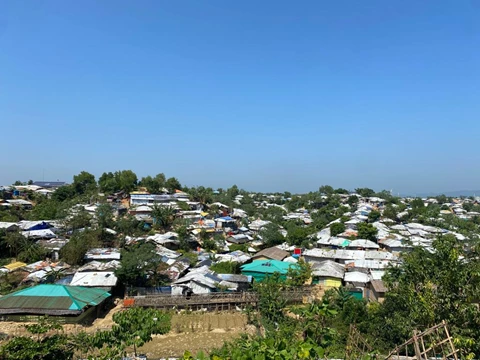The return of bright, cooler days (and unfortunately the mosquitoes in full force) signals the beginning of Bangladeshi winter, and one year since I started my position as Associate Programme Officer with UNHCR in Cox’s Bazar, where the organisation delivers humanitarian assistance to around one million Rohingya refugees. Having never worked in a context like Bangladesh, it was difficult to form expectations about what my year would look like, but it’s safe to say that my time so far has far exceeded my expectations in terms of the variety of work that I’ve been exposed to, and the opportunities to learn and develop in my role. The year has not been without its challenges and the learning curve has been steep but overall I am very much enjoying my time in Bangladesh and my role within the operation in Cox’s Bazar.
Over the past 6 months or so I have had the opportunity to work on a variety of different projects. My team works directly on child protection, gender-based violence prevention and education projects, so I have been in the refugee camps monitoring the delivery of these services, and working with UNHCR’s local partner organisations to ensure that services are being delivered to refugees in an effective and impactful manner. Last year, I also travelled to Bhasan Char, an island off the coast of Bangladesh, where new refugee shelters have been constructed. Approximately 28,000 Rohingya refugees have been relocated to Bhasan Char by the Government of Bangladesh, and UNHCR is working with the government and local and international NGOs to ensure the delivery of essential humanitarian services. Whilst on the island I worked closely with other UNHCR colleagues and staff from local NGOs to monitor the projects and ensure that mechanisms were put in place to protect refugees and make sure that they have access to the life-saving assistance they need.
Also, at the end of last year, I had the exciting opportunity to welcome the Jersey Overseas Aid team to Bangladesh (Terry Morel, JOA Commissioner, and Ed Lewis – Head of Programme), as they came to learn more about the Bangladesh response and how donor funds are being spent on delivering services to the Rohingya refugees. It was particularly useful to hear Terry’s observations as she had visited the camps in 2018 in her capacity as UNHCR Director. I was fortunate to be able to accompany Ed and Terry on their trip to the camps where we visited a learning centre for refugee children, and a jute production centre, where refugee women are engaged in livelihoods activities including hand embroidery and jute bag production, amongst others. It was wonderful to have the opportunity to support the UNHCR Donor Relations team in showcasing the important work that UNHCR is doing here.
As UNHCR looks ahead to 2023, challenges in planning the Rohingya response remain acute. There are several challenges to contend with in delivering humanitarian assistance to refugees in this context. Bangladesh is the second most natural disaster-prone country in Asia and the Pacific. Having just passed through the yearly monsoon and cyclone seasons, which bring high risk of floods and landslides, the country enters its dry season, which brings with it a high of fire incidents in the camps.
Moreover, the response is now well into its sixth year, and the protracted nature of the crisis brings new challenges. UNHCR and its partners must look for solutions which promote self-reliance amongst refugees and reduce reliance on humanitarian assistance, whilst equipping refugees with vocational skills training that they can utilise when the conditions allow for safe and voluntary return to Myanmar. With the refugee population expected to reach 977,800 by the end of 2023, and donor funding set to continue to decrease in the coming years, humanitarian actors are looking for innovative ways to continue to deliver lifesaving assistance to the Rohingya population.
Working in a field location has been a very rewarding, if sometimes challenging, experience, given the complexity and enormity of the refugee context in Bangladesh. The opportunity to work and learn from colleagues with specialist expertise, and who have experience of responding to crises across the globe, has enabled me to strengthen my skills and understanding of how a humanitarian organisation operates on the ground. I’m lucky to be surrounded by a great group of colleagues and to have made some good friends in Cox’s Bazar, and I imagine my second year will pass by just as quickly as the first! I’m looking forward to my next year with the Bangladesh operation and hope to continue to improve my skills and contribute to the essential work that UNHCR is undertaking to provide protection to refugees in Cox’s Bazar.


